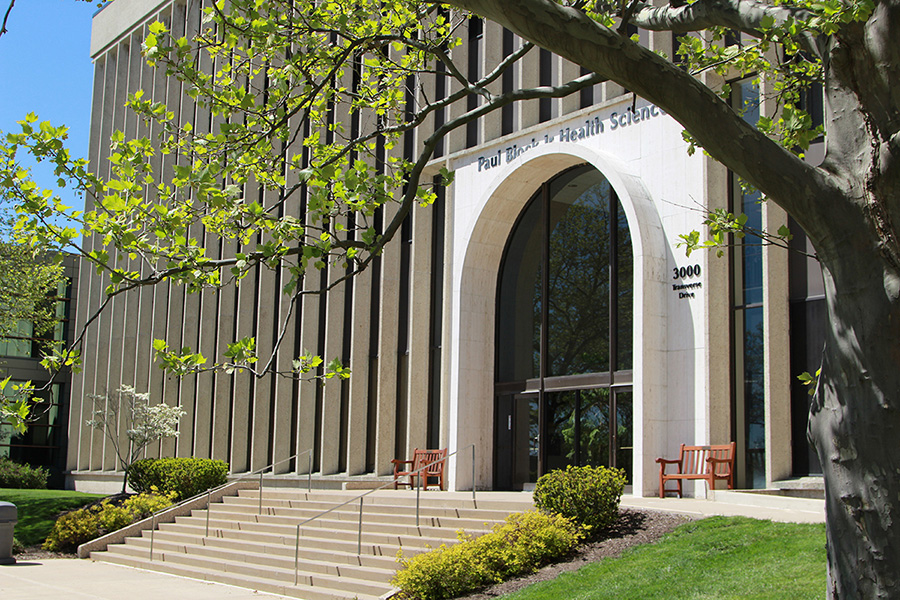What Is Bioinformatics?
- Bioinformatics, also called computational biology, is the development and use of computer-based methods to analyze very large datasets. These analyses can help identify genes associated with specific diseases or can identify new drug targets for treating specific diseases.
- The Bioinformatics program is most interested in macromolecular biomarkers, including DNA (genetic polymorphisms or differences in methylation status), RNA (transcript levels or splicing variants), and protein (polypeptide levels or modification status).
- NIH Biomarkers Definition: “A characteristic that is objectively measured and evaluated as an indicator of normal biological processes, pathogenic processes, or pharmacologic responses to a therapeutic intervention.”
- World Health Organization definition of Biomarkers: “Any substance, structure, or process that can be measured in the body or its products and influence or predict the incidence of outcome or disease.”
What is Our Mission?
The Bioinformatics program’s mission is to improve the human condition through:
-
- effective multi-disciplinary and inter-professional interactions
- excellence in biomedical research and education`
- distinctive entrepreneurship to bring innovations to the community
The program’s goals are to achieve:
-
- regional leadership in bioinformatics, genomics, and proteomics
- distinction in biomarker discovery
- effectiveness in bringing research discoveries into clinical use
Day in the Life
Hear directly from our graduate students
BIOINFORMATICS PROGRAM DEGREES
PH.D. IN BIOMEDICAL SCIENCE, CONCENTRATION IN BIOINFORMATICS
- The Doctor of Philosophy (Ph.D.) in Biomedical Science with a concentration in Bioinformatics is designed for those interested in research careers, whether academic, commercial, or governmental. Graduates often go on to postdoctoral training, or jobs in biotechnology, academia, or government agencies.
- Involves six core courses in bioinformatics, plus additional courses in molecular biology, electives, and a research project leading to a thesis. Short commercial internships may be taken as an elective.
MASTERS IN BIOMEDICAL SCIENCE, CONCENTRATIONS iN
BIOINFORMATICS OR CLINICAL BIOINFORMATICS
- This Masters degree program is designed for those interested in research careers, whether academic, commercial, or governmental. Graduates often go on to earn Ph.D., M.D., or M.B.A. degrees.
- Involves four core courses in bioinformatics, plus additional courses in molecular biology, electives, and a research project leading to a thesis. Short commercial internships may be taken as an elective.
DUAL DEGREE: BS IN BIOLOGY / MSBS IN BIOINFORMATICS
- The dual degree “pipeline” program is designed for first year college students interested in the biological sciences at the University of Toledo.
- It is a great opportunity to earn both the bachelor’s degree in biology and the master’s degree in bioinformatics in 5.5 years, saving both time and costs.
CERTIFICATE IN BIOINFORMATICS & BIOMARKERS
- This certificate program provides essential training in the use of computer-based methods for analysis of biomedical data, including identification and evaluation of biomarkers.
- Designed to supplement training for current PhD students, postdoctoral fellows, medical residents, or those currently employed in jobs where such training would be useful. Law students interested in relevant areas of intellectual property law also find this training useful.
CERTIFICATE IN CLINICAL BIOINFORMATICS (junior faculty)
- Apply clinical bioinformatics theories, methods and tools related to personal health, health care, public health, and biomedical research
- Describe analytic tools associated with systems/bioinformatic approaches
- Apply Intelligent Data Analysis Techniques
- Describe application of bioinformatic methods to clinical problems, by demonstrating
understanding of:
a) Biomarker discovery and validation
b) Major diseases such as cancer, diabetes, cardiovascular, and autoimmunity - Learn more about this certificate program.
QUESTIONS?
Please contact us if you have additional questions.



